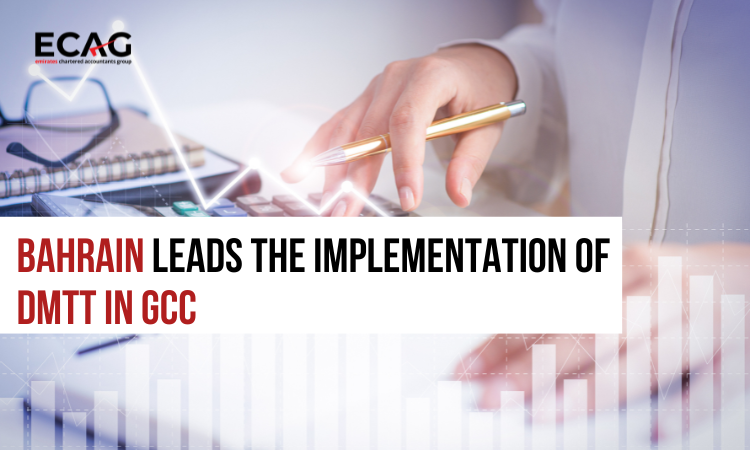- December 13, 2024
- Posted by: admin@ecabahrain
- Category: Tax

Introduction to Bahrain’s Domestic Minimum Top-Up Tax (DMTT)
On September 1, 2024, Bahrain set a regional milestone by introducing the Domestic Minimum Top-Up Tax (DMTT) via Decree-Law No. (11) of 2024. Effective January 1, 2025, Bahrain will be the first country in the Gulf Cooperation Council (GCC) to implement this tax, aligning with the OECD’s Base Erosion and Profit Shifting (BEPS) framework. This progressive move underscores Bahrain’s dedication to fostering global tax fairness and transparency while positioning itself as a leader in regional economic reforms.
The DMTT ensures that multinational enterprises (MNEs) operating in Bahrain are subject to a minimum effective tax rate of 15%, closing loopholes that allow profit shifting and ensuring equitable contributions.
What is DMTT?
The DMTT is a policy aimed at ensuring a minimum tax rate of 15% for Multinational Entities (MNEs). This measure addresses the global minimum tax concerns and aligns Bahrain with OECD standards for Base Erosion and Profit Shifting (BEPS).
Key features of DMTT
Effective Date:
Fiscal years starting on or after 1 January 2025. Fiscal year is the accounting period used by the Ultimate Parent Entity (UPE) of the MNE Group.
Registration Authority:
MNEs to assign a Filing Constituent Entity (CE) in Bahrain which will be responsible for registering with the National Bureau for Revenue (NBR).
Applicability:
The DMTT applies to Constituent Entities (CEs) located in Bahrain that are part of a Multi-National Entity (MNEs) with consolidated annual revenues exceeding €750 million for at least two of the preceding four fiscal years.
Tax Rate:
If the aggregated results of Bahraini constituent entities (CEs) of a MNE do not yield a 15% effective tax rate (ETR), an additional tax will be imposed to bring the ETR up to this threshold.
Excluded entities:
As per Art (4) of Decree Law, following are excluded;
- Government bodies.
- International organizations.
- Non-profit organizations.
- Pension funds.
- An investment fund that is an Ultimate Parent Entity.
- A real estate investment vehicle that is an Ultimate Parent Entity.
Except for a pension service entity, an Entity where at least 95% of the value of the Entity is directly or indirectly owned by one or more Excluded Entities referred above, whether directly or indirectly, provided that the Entity operates exclusively or almost exclusively to own assets or invest funds on behalf of Excluded entities and it engages exclusively in activities ancillary to those performed by Excluded Entities. - Except for a pension service entity, an Entity where at least 85% of the value of the Entity is directly or indirectly owned by one or more Entities referred above, whether directly or indirectly, provided that most of the Entity’s income is primarily derived from gains or losses on shares or equity interests excluded from the computation of Constituent Entity Income or Loss.
Further guidelines to be outlined in the Executive regulation
Exceptions & Exclusions:
1. De-Minimis Rule:
The Tax for a Filing Constituent Entity for a Fiscal Year shall be zero if the following two conditions are met;
Average CE revenue for the current and the two preceding Fiscal Years of all Bahrain CEs is below EUR 10 million; and
Average CE income or loss for the current and the two preceding Fiscal Years of all Bahrain CEs is below EUR 1 million
2. International Activity Exclusion:
Tax rate shall be zero, if all the following conditions are met by the MNE:
i) CEs are in no more than six jurisdictions; and
ii) The net book value of tangible assets across all jurisdictions does not exceed EUR 50 million, excluding the jurisdiction where the MNE Group has the highest value of tangible assets when the global minimum tax rules first apply to that MNE Group; and
iii) No ownership interests in the CEs are held by a parent applying the Income Inclusion Rule.
Note: This shall not apply for any Fiscal Year that starts later than five years after the first day of the first Fiscal Year when the Multinational Enterprise Group entered in scope of the Model Rules issued by OECD.
3. Safe Harbor Rules:
i) Simplified ETR test: An alternative ETR for the MNE Group in Bahrain is equal to, or greater than 16% and 17% for fiscal years beginning in 2025 and 2026, respectively.
ii) Routine profits test: Total CbCR profit (loss) of the MNE Group in Bahrain is equal to, or less than the substance-based income exclusion amount determined under the DMTT Law.
Conclusion
Implementing the DMTT demonstrates Bahrain’s commitment to adhering to international taxation standards. This alignment not only enhances its reputation but also encourages other GCC countries to consider similar reforms, fostering a more unified regional tax structure.
Multinational groups operating in Bahrain should proactively prepare for the upcoming DMTT regime, as it is likely to bring significant implications, including increased tax costs and a heightened compliance burden.
With the DMTT Law expected to align with the OECD Model Rules, multinational enterprise (MNE) groups have a solid foundation to begin impact assessments, which can be refined as further regulations are released .
Please contact us for further assistance.
Mr. John Jose
Manager – Bahrain Operations
+ 973 37698998
john@emiratesca.com



